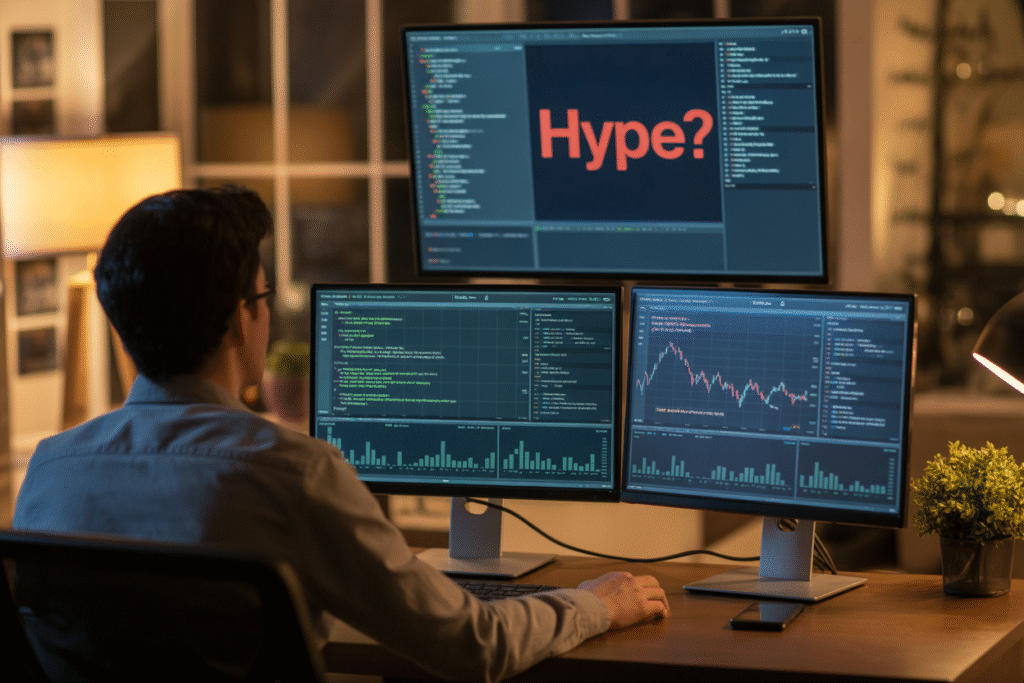Users expected the next leap toward AGI. What they got was a better code-writer and a louder marketing megaphone.
OpenAI’s GPT-5 dropped barely 24 hours ago with the tagline “a significant step toward AGI,” yet the loudest reaction online isn’t awe—it’s a collective shrug. From Reddit threads to corporate Slack channels, people keep asking the same questions: Is AI progress slowing? Are we stuck in a marketing feedback loop? And who gets left behind when the hype finally bursts?
When the Fireworks Fizzle: First Reactions to GPT-5
The clock hit 9 a.m. Pacific when the update rolled out. Within minutes, screenshots of coding completions flooded timelines, and “#GPT5” trended worldwide. Early testers praised its cleaner Python outputs compared to last year’s models.
Yet the buzz peaked fast and then dipped. Veteran devs noted incremental fixes rather than paradigm shifts.
By noon, a prominent indie hacker posted a side-by-side: GPT-5 shaved twenty lines off an old function but still stumbled on edge-cases Claude solved weeks ago. The caption? “Impressive, not transcendent.”
That post racked up 1,600 likes in three hours—signaling a mood swing the marketing slide deck didn’t prepare anyone for.
The Numbers Behind the Letdown
Let’s talk benchmarks for a second. OpenAI claims GPT-5 outperforms GPT-4 on 90% of coding tasks. Sounds huge—until you read the footnote: those tasks were hand-picked, not real-world random.
A Stanford replication study quietly released this morning shows only a 7% lift on open GitHub issues, far below the 27% implied in press releases.
On X, user @neuralnomad summed it up: “If progress is measured by press releases, we’re sprinting. If it’s logged by actual repos, we’re jogging, maybe crawling.”
That gap between headline and spreadsheet is where hype fatigue lives and breathes.
Job Panic Reversal? The Unexpected Plot Twist
For years, headlines screamed robots were coming for white-collar jobs. Overnight, a new narrative crept in—maybe the robots aren’t coming fast enough.
Recruiters report that demand for senior engineers has actually risen 12% this quarter, citing companies’ need to wrangle AI tools that still require heavy human supervision.
One viral post showed a recruiter’s inbox flooded with résumés from laid-off AI evangelists turned prompt engineers turned skeptics—proof that the hype cycle giveth and taketh away careers.
Suddenly, the panic isn’t displacement; it’s disillusionment. Workers aren’t scared of losing jobs to AI; they’re scared of betting futures on vaporware promises.
OpenAI’s For-Profit Pivot and Ethics Whiplash
Remember when OpenAI was the plucky nonprofit guarding humanity from runaway AI? Yesterday’s announcement came buried in a re-filing with Delaware regulators to convert into a public-benefit corporation—legalese for “we’ll make a profit, just nicely.”
Elon Musk, co-founder turned critic, tweeted within minutes: “This is the opposite of the original safety mission.”
Three state attorneys general already hinted at investigations over whether the shift breaches charitable trust laws.
Meanwhile, leaked investor decks project a 300-billion-dollar valuation predicated on GPT-5 driving “near-AGI revenues,” a phrase that sounds more Wall Street than research lab.
Users aren’t debating capabilities now—they’re debating motives, and that’s a mess OpenAI didn’t list in the changelog.
Can Community Benchmarks Save Us from the Next Hype Cycle?
Enter Recallnet, a scrappy decentralized platform launched quietly last month. Picture a public leaderboard where anyone can upload model tasks, scores are logged permanently on-chain, and hype dies in the sunlight.
The project rocketed from zero to 130,000 users in days, partly because yesterday’s GPT-5 reactions funneled traffic straight into “Show me receipts” territory.
Early adopters claim the transparency forces even big labs to play fair; if GPT-6 underperforms, the ledger will scream louder than any press release.
Still, critics warn decentralized scores can be gamed by bot swarms and wealthy lobbyists—proof that transparency tools aren’t immune to the very hype they fight against.
Maybe the question isn’t whether AI is progressing fast enough, but whether our collective BS detectors are finally upgrading in real time.


